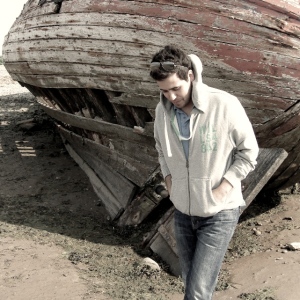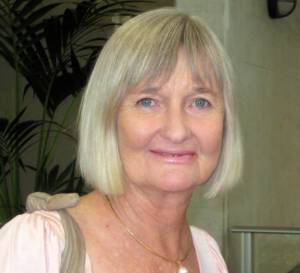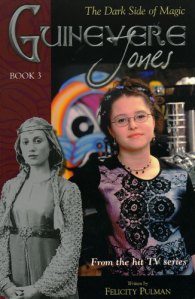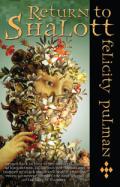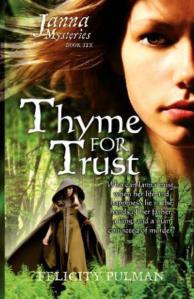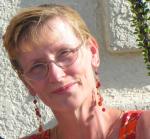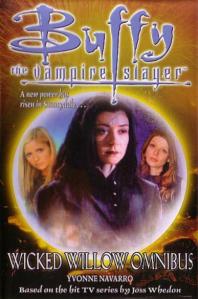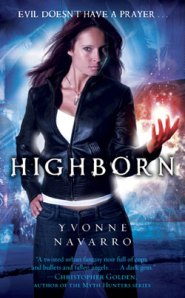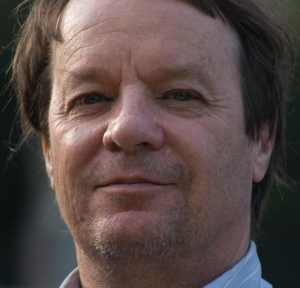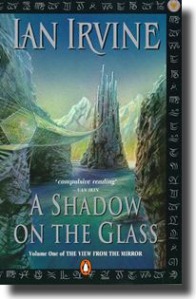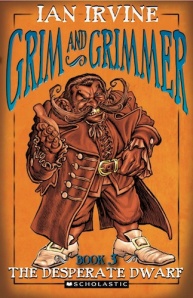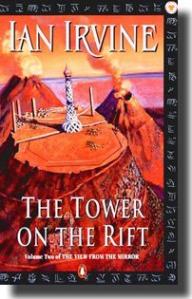As the next of my series featuring fantastic female fantasy authors (see disclaimer) but this has moprhedinto interesting people in the speculative fiction genre. Today I’ve invited the talented cross-genre author, Fiona McIntosh, to drop by.
Watch out for the give-away question at the end of the interview.
 Q: You are well known for your fantasy novels with four trilogies, Valisar, Percheron, The Quickening and Trinity, plus a children’s fantasy, Whisperer. You cut your teeth on big fat fantasies. Do you keep a flow-chart to keep track of all the characters, the relationships, the timelines and the festivals of your invented worlds?
Q: You are well known for your fantasy novels with four trilogies, Valisar, Percheron, The Quickening and Trinity, plus a children’s fantasy, Whisperer. You cut your teeth on big fat fantasies. Do you keep a flow-chart to keep track of all the characters, the relationships, the timelines and the festivals of your invented worlds?
 I wish I did. No, I’m a vicious freefaller. My reality as a writer is that no matter how hard I try to plan, my subconscious refuses to play along. Even glossaries are beyond me and while the notion of a document on my desktop filled with lots of helpful facts about my own story and its characters makes such perfect sense, I fail miserably at it. Given that in between volumes of fantasy I’m working on other books, you’d think a plan would be vital…at the very least a working file but no. My consolation is that I’ve now written 22 novels in this manner and it just seems to work for me. If you’re wired similarly…it’s hard to change – but for those of you nodding your head take heart, it does have some advantages.
I wish I did. No, I’m a vicious freefaller. My reality as a writer is that no matter how hard I try to plan, my subconscious refuses to play along. Even glossaries are beyond me and while the notion of a document on my desktop filled with lots of helpful facts about my own story and its characters makes such perfect sense, I fail miserably at it. Given that in between volumes of fantasy I’m working on other books, you’d think a plan would be vital…at the very least a working file but no. My consolation is that I’ve now written 22 novels in this manner and it just seems to work for me. If you’re wired similarly…it’s hard to change – but for those of you nodding your head take heart, it does have some advantages.
[youtube=http://www.youtube.com/watch?v=D1xZ1fw8KkU&feature=related]
Q: I attended Shekilda the Sisters in Crime conference a few weeks ago and met many wonderful crime writers, all smart articulate women. Now I discover you write crime as well. There’s your DCI Jack Hawksworth books Bye Bye Baby and Beautiful Death. Many of the fantasy writers I’ve met also write crime. Why do you think this is?
 Crime is a genre that just about everyone reads at one time or another and also the sort of stories that most people pepper through their reading year even if they’re not committed fans of the genre that reads their way through various writers’ bookshelves. It can harmoniously blend into mainstream because of that wide appeal so I think many of us are likely writing it because we enjoy reading a good crime novel and thus understand the expectations of readers. I also believe that crime writing is a fantastic counterbalance to fantasy writing. Fantasy is all about how far can you push your own creative/imaginative powers and ideas. With crime it’s grounded in reality – so for me it’s the two opposing poles of the storytelling world and I like playing with characters in both. I guess it must be the same for other fantasy writers who, like me, enjoy the mix up of genres. Keeps us sharp in each area!
Crime is a genre that just about everyone reads at one time or another and also the sort of stories that most people pepper through their reading year even if they’re not committed fans of the genre that reads their way through various writers’ bookshelves. It can harmoniously blend into mainstream because of that wide appeal so I think many of us are likely writing it because we enjoy reading a good crime novel and thus understand the expectations of readers. I also believe that crime writing is a fantastic counterbalance to fantasy writing. Fantasy is all about how far can you push your own creative/imaginative powers and ideas. With crime it’s grounded in reality – so for me it’s the two opposing poles of the storytelling world and I like playing with characters in both. I guess it must be the same for other fantasy writers who, like me, enjoy the mix up of genres. Keeps us sharp in each area!
Q: You say you research extensively for your crime novels, going to London and walking the streets where you set the books. You used to work in the travel industry and I know you travel a lot. Does this mean you can write your trips off your tax? And having been born in Britain, does it feel like home to you when you go back there?
 I have been a traveller all of my life. As a child I travelled with my father’s work, as soon as I was old enough to fly the nest I was heading off to France and then further afield to Australia, arriving here at 20. I deliberately made a beeline for the travel industry, working for a tourism authority, an international airline and ultimately with my husband in our own travel publication. I left the magazine to write books but I’ve never lost my joy of travel and it’s true that all of my books tend to be Euro-centric because I do believe we’re all mostly a product of our upbringing and I was raised on the other side of the world. And so because my historical sagas have a broad international focus, my crime is British based, my fantasy has a faux European medieval world, it does mean I’m usually heading off on a plane somewhere to gather up the research material. Does Britain feel like home? Yes and no. I’m one of those people for who home is where my closest loved ones are and so my heart is definitely in Australia with my immediate family, all Aussies and fortunately my parents and brother emigrated out here too. However, I think there’s such a thing as a ‘soul home’ and for me that’s Britain. When you spend 20 years of your life growing up somewhere, you can’t pretend that it isn’t imprinted on your soul. That doesn’t mean I prefer it or necessarily want to live there – I’m happy to visit but I do like to get my fix. Let me assure your readers that because I travel the world extensively and always have, I can confidently say we all live in the best country on the planet. Anyway, I do love to get back to London regularly and particularly to Sussex where I was born. I have lots of lovely family still in the UK so that’s the major drawcard…and Colin Firth, of course.
I have been a traveller all of my life. As a child I travelled with my father’s work, as soon as I was old enough to fly the nest I was heading off to France and then further afield to Australia, arriving here at 20. I deliberately made a beeline for the travel industry, working for a tourism authority, an international airline and ultimately with my husband in our own travel publication. I left the magazine to write books but I’ve never lost my joy of travel and it’s true that all of my books tend to be Euro-centric because I do believe we’re all mostly a product of our upbringing and I was raised on the other side of the world. And so because my historical sagas have a broad international focus, my crime is British based, my fantasy has a faux European medieval world, it does mean I’m usually heading off on a plane somewhere to gather up the research material. Does Britain feel like home? Yes and no. I’m one of those people for who home is where my closest loved ones are and so my heart is definitely in Australia with my immediate family, all Aussies and fortunately my parents and brother emigrated out here too. However, I think there’s such a thing as a ‘soul home’ and for me that’s Britain. When you spend 20 years of your life growing up somewhere, you can’t pretend that it isn’t imprinted on your soul. That doesn’t mean I prefer it or necessarily want to live there – I’m happy to visit but I do like to get my fix. Let me assure your readers that because I travel the world extensively and always have, I can confidently say we all live in the best country on the planet. Anyway, I do love to get back to London regularly and particularly to Sussex where I was born. I have lots of lovely family still in the UK so that’s the major drawcard…and Colin Firth, of course.
[youtube=http://www.youtube.com/watch?v=hasKmDr1yrA]
Q: Not only do you write crime and fantasy, but also write historical fiction in Fields of Gold, which is set in India in the 1920s. Historical fiction is another area that is dear to many of the fantasy authors I interview. I see you based this book on a fictionalised account of your two grandfathers with a bit of poetic licence. Was it fun doing the research?
 I love history so digging around in the past is pure pleasure. But to be digging around in my family’s past was fun but also confronting at times. I learned plenty that we didn’t know about, some of it painful. I was able to walk in the footsteps of my four grandparents in places like Cornwall and Sussex in the UK as well as Myanmar and India. I met family in India I barely knew existed and that was an emotional and unforgettable experience. Walking the streets of Bangalore in southern India that my parents knew as children was filled with poignancy and frankly any trip to India – for whatever reason – is enriching, challenging, memorable. I would go back in a blink…and will sometime soon.
I love history so digging around in the past is pure pleasure. But to be digging around in my family’s past was fun but also confronting at times. I learned plenty that we didn’t know about, some of it painful. I was able to walk in the footsteps of my four grandparents in places like Cornwall and Sussex in the UK as well as Myanmar and India. I met family in India I barely knew existed and that was an emotional and unforgettable experience. Walking the streets of Bangalore in southern India that my parents knew as children was filled with poignancy and frankly any trip to India – for whatever reason – is enriching, challenging, memorable. I would go back in a blink…and will sometime soon.
Writing Fields of Gold showed me that historical fiction is probably the area of writing that most interests me and it’s because I am writing about a different era. It’s likely why writing fantasy set in medieval times comes to me with a fluidity that I know wouldn’t be there if I attempted contemporary fantasy. My next project is a WWll novel that was a joy to write because it has allowed me to set a book in France during a crisis era – learning about occupied France – and particularly Paris – has been an education and I have thoroughly enjoyed it. It meant a tower of books to read and of course visits to the locations in the books, lots of interviews with locals and what has felt like endless research on so many small details. It’s finally done – and in fact as I answer this question I’ve just finished reading the page proofs today so the novel is ready now and I shall set it free. It is published in April 2012 by Penguin. And will roll out internationally from later in 2012. I’m writing its sequel now, set in the 50s and 60s in Britain, Australia and France. I hope to have that finished to first draft by the end of November 2011. This sequel required me to travel to some new destinations including Austria and Poland including Auschwitz-Birkenau and Schindler’s Factory. Although this is not a Holocaust story, I’ve read, seen, experienced a lot about the Holocaust in a compressed period preparing for these books; I felt I needed to know far more more than I did so that I could understand better the psyche of one of my characters profoundly affected by it. It’s been a stunningly emotional period as a result and I suspect this area of research is going to travel with me all of my life now.
 Q: I find it interesting that you write the crime, historical sagas and your fantasy all under the one name Fiona McIntosh. Your first crime book appeared under Lauren Crow but you reverted to Fiona McIntosh. Why did you do this?
Q: I find it interesting that you write the crime, historical sagas and your fantasy all under the one name Fiona McIntosh. Your first crime book appeared under Lauren Crow but you reverted to Fiona McIntosh. Why did you do this?
I always believed it was ill-advised to use a pen name. I was thrilled when we changed back to one name across all books. In fairness to my publisher, it was only trying to protect the fantasy books, which had such a strong following. I believed then and still do that readers are discerning creatures, more than capable of deciding to read my fantasy while not being offended that I choose to write across genres. The Lauren Crow experiment only lasted a few months I’m pleased to say but it was never my idea or desire.
Q: You say you are a person who rushes into things and in an interview on SF Site you said: ‘It’s very easy to stand back and say ‘oh that was an odd decision by Wyl’ but this is deliberately allowed by me to ensure he doesn’t always follow the ‘intelligent’ pathway that someone who is utterly objective can. Wyl is not objective most of the time. He’s never out of a bad situation in this story and constantly required to make decisions under enormous pressure not just for his own survival but for the safety of others. I like a bit of confusion — makes it more realistic because life is never straightforward.’ So your characters make mistakes. In real life we all make mistakes. Are there things that you wish you could go back and change in your life?
 Decisions are presented to us everyday – sometimes they’re small, other times overwhelming. And taking the ‘right’ pathway is always going to look a lot clearer in retrospect. I am a decision-maker. I don’t dither and I’m always comfortable that I’m making the best decision with what I know at the time. As the writer, it’s easy to be the puppet master and look ahead for characters – save them heartache and bad moves – but I’d rather they behaved as we all do; age, maturity, wisdom all comes into it, plus only knowing so much about a situation and basing their decisions on that. Otherwise for me it doesn’t feel real. Nevertheless – sigh – some reviewers still find the need to point out that some characters make odd decisions. Yes they do…and that’s life.
Decisions are presented to us everyday – sometimes they’re small, other times overwhelming. And taking the ‘right’ pathway is always going to look a lot clearer in retrospect. I am a decision-maker. I don’t dither and I’m always comfortable that I’m making the best decision with what I know at the time. As the writer, it’s easy to be the puppet master and look ahead for characters – save them heartache and bad moves – but I’d rather they behaved as we all do; age, maturity, wisdom all comes into it, plus only knowing so much about a situation and basing their decisions on that. Otherwise for me it doesn’t feel real. Nevertheless – sigh – some reviewers still find the need to point out that some characters make odd decisions. Yes they do…and that’s life.
On a personal note I can’t think of many poor life decisions, that would require me to time travel and re-write my own history and besides, each decision has led to the next set of circumstances and I’m pretty happy with where I am right now. I believe in doors openings as others close and that making a decision and taking a step forward is far better than being frozen in indecision. So to answer your question, no I don’t wish to go back and change things but there are occasions I guess when I could wish to have been wiser at the time. But, as I said, that’s life….
Q: You said in an interview on the ABC that your father (who is half Indian) didn’t come to anything at your school because he didn’t want to compromise you. ‘When I was at junior school, seven or eight years old, and there was an outbreak of lice in the school. And they just automatically blamed the Indian family. And so the health inspectors came to our house. In fact, we were the people who were bathing more than the Brits.’ Are you drawn to explore discrimination and persecution in your books?
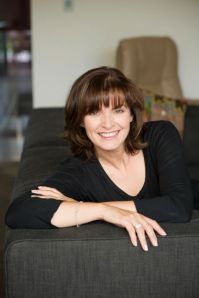 No. And I would never set out with any sort of agenda for my novels. I write popular fiction and the whole point of that – for me anyway – is that my job as the writer is to be an entertainer. I’m happy to be a writer who crafts books that will keep a reader engaged and turning pages during a long flight, a tedious delay, or be that book that someone can’t wait to get back to during their lunch break. So long as my books provide that escape, I’ve done my job. And really, if I look back over all my novels, the common theme seems to be revenge! <grin> However, I suspect discrimination and persecution enter my stories because in the historical periods that I draw from life was not nearly so politically correct or protected. In fact in the middle ages life was cheap and vulnerable people were persecuted daily and discrimination of all kinds was rife.
No. And I would never set out with any sort of agenda for my novels. I write popular fiction and the whole point of that – for me anyway – is that my job as the writer is to be an entertainer. I’m happy to be a writer who crafts books that will keep a reader engaged and turning pages during a long flight, a tedious delay, or be that book that someone can’t wait to get back to during their lunch break. So long as my books provide that escape, I’ve done my job. And really, if I look back over all my novels, the common theme seems to be revenge! <grin> However, I suspect discrimination and persecution enter my stories because in the historical periods that I draw from life was not nearly so politically correct or protected. In fact in the middle ages life was cheap and vulnerable people were persecuted daily and discrimination of all kinds was rife.
Q: I was prompted to start this series of interviews because there seems to be a perception in the US and the UK that fantasy is a bit of a boy’s club. Do you think there’s a difference in the way males and females write fantasy?
Possibly. But these days although I’m writing it, I’m not reading enough fantasy to know. However, I would suggest that traditionally – and here’s a huge generalisation – male writers do the whole battle thing with aplomb, while female authors really know how to plumb the emotional depths of a fantasy story. That said, I think women have become rather adept at writing wars and bloodletting and men have wrapped their storytelling abilities very nicely around more emotional characters and storylines. Take Guy Gavriel Kay, for instance. I don’t think I’ve read one of his fantasy stories and not wept with or for a character. So, I’ve not really come up with an answer for you, have I? Not wishing to fence-sit – and I could be way off – it strikes me that the male writers I meet – particularly the emerging ones, yet to crack the fabulous publishing contract – are more into the world building stuff and perhaps delivering complex worlds. There, that should have people howling for my blood!…my experience only.
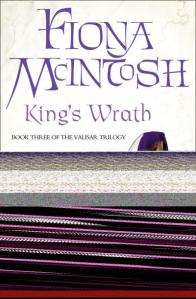 Q: Following on from that, does the gender of the writer change your expectations when you pick up their book?
Q: Following on from that, does the gender of the writer change your expectations when you pick up their book?
Not any more. But perhaps it used to 30 years ago – men did battles, women did emotion well…that’s what I thought. I remember reading BattleAxe when it was still in draft and feeling utterly gobsmacked to learn afterwards that it was a female author. Similarly, I was thrilled to learn that Robin Hobb was a woman. Both of them inspired me to give writing fantasy a go. Over the last two decades that I’ve been focused on fantasy, gender has not been an issue for me – it’s not ever a consideration when buying a book in any genre. I’m far more intrigued by a cover, the blurb and its opening few pars than by the name on it
Q: So what’s next…more of the same?
I enjoy writing fantasy so that’s not going to stop unless I sense that I can’t maintain a freshness in my stories any longer. And writing historical fiction is a big personal buzz because each book’s research educates and enriches me and at the age I am now, I take great pleasure in learning new ‘stuff’, so that will continue. I would like to craft more crime but that will depend on publishers who would probably prefer me to knuckle down and just write crime exclusively for a while but that’s unlikely given my track record. While other genre writers dabble with crime, in the main I hope it’s fair to say that crime writers have a tendency to keep writing crime exclusively. I can’t commit wholly to one genre. I’ve been writing some children’s fantasy, which is fun – it feels as though it has no bounds and I’ve had a good time with the characters. I would love to write a thriller and also a big emotional romance. I have a dream to write a cookbook and an even bigger one to write a screenplay. I’d love to be part of a writing team that collaborates on a TV script. So my ambitions are broadening, which is healthy I believe, and I probably take this attitude because I would hate to get stale in one area and risk losing the joy of storytelling.
 Q: And here’s the fun question. If you could book a trip on a time machine, where and when would you go, and why?
Q: And here’s the fun question. If you could book a trip on a time machine, where and when would you go, and why?
Blimey, there are so many eras I’d love to travel back in time to experience and so many people I would want to meet and as I thought about this it became so overwhelming with the freedom of choice you’ve given me that I couldn’t settle on one – do I meet Henry VIII? Do I drop in on Hitler’s Europe that I’ve been researching so much and try and understand that madness? Do I walk around 11th century Constantinople? Fun to eavesdrop the Romans, or meet Cleopatra! Do I go back further still in search of some answers to big questions? In the end I simplified it, brought it all closer to home, and as odd as it sounds I think I’d want to go back to my early childhood and be aware enough to pay more attention to it. I have a shocking memory at the best of times so to be able to relive – as a voyeur – some of the great times of childhood would be incredible and I think to spend time again with my granny, whom I was close to and who was a tremendous influence on my life, would be exquisitely special knowing what I know now. I’d quite like to appreciate my parents as much younger people too – in their thirties – full of life and energy, dressing up and going out dancing, drinking, playing, entertaining. We can often forget our seniors were once young, crazy and dreamy. Although we didn’t have much money I had a busy, fun filled and happy childhood and so I’m not surprised that I find myself thinking it would be a grand romp to revisit it but as an omnipotent observer rather than a participant.
A copy of Royal Exile, book one of the Valisar series could be yours, dear reader, by sharing the following:
If you could be a character in any book, who would you be and why?
Follow Fiona on Facebook – I have two pages….and you are welcome to join me at either, or both: Fiona McIntosh or at Fiona McIntosh Fans Group.
http://www.fionamcintosh.com






![Newton-CityOfRuinPBUK[3]](http://writersagainstobscurity.files.wordpress.com/2011/11/newton-cityofruinpbuk3.jpg)
